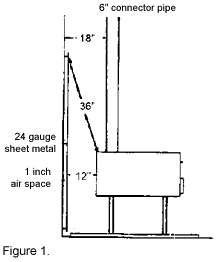Let s cover the basics.
Coal stove venting requirements.
It has to be at least the size of the stove collar.
Un certified woodstove clearance distance.
Un certified woodstove clearance distances when the stove has a sheet metal jacket or casing 36 to combustibles.
Some older wood burning stoves are rear vent models.
There are batch or hand fired coal stoves and stoker coal stoves.
Consult with your local building permit and code department to ensure that your equipment and its installation complies with their requirements.
Each hearth appliance requires a particular type of vent pipe which are categorized accordingly.
If you have an existing liner in the masonry chimney.
Both of them have advantages and disadvantages.
Batch or hand fired coal stoves are more hands on hence.
The venting systems with the exception of direct vent appliances must terminate at least 4 below 4 horizontally or 1 above any door window or gravity air inlet into the building.
For example a solid fuel appliance such as a wood burning or coal burning stove uses class a chimney pipe which is made to withstand the higher flue gas temperatures produced by that fuel.
If you decide to install a coal stove in your home you ll be looking at two options.
60 above the stove top to the ceiling or any combustible above the heater.
To prevent fires ashes that are cleaned out from the stove or fireplace should be shoveled into a metal bucket with a metal lid and placed outside on the ground away from the building.
Generally coal stoves need chimneys to operate.
The bottom of the vent terminal must be located at least 1 above finished grade.
The automatic stokers have combustion fans so draft is less of an issue.
The minimum height of the wood coal stove or the fireplace chimney masonry or metal would be 3 above the roof surface and 2 above anything within 10 of course you can go higher which usually improves draft.
Hand fired models need strong draft to pull combustion air into the fire to make the coal burn.
In the end it will probably come down to personal preference.
However when converting to commercial type ranges venting may be needed.
In the united states venting most residential gas ranges and cooktops to the outside is not required.

